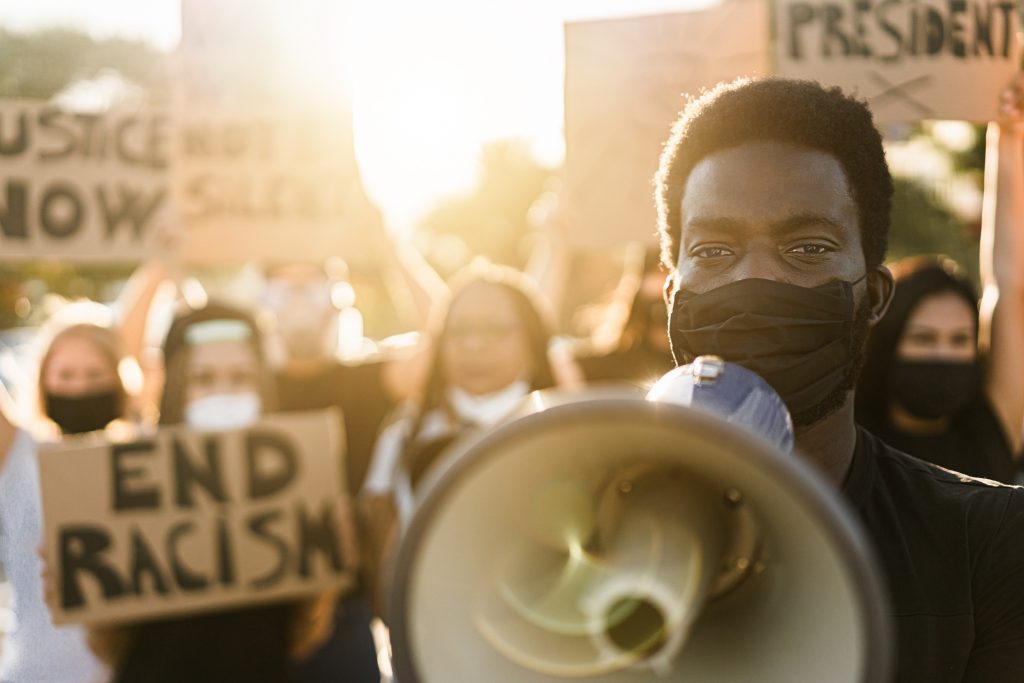Six months into his presidency, Joe Biden has made huge progress helping Black Americans—and he owes much of that success to his former boss.
When President Joe Biden and Vice President Kamala Harris met last week with leaders from legacy Black civil rights organizations, it marked a stark shift in the White House’s engagement on civil rights and race-related issues. The rhetorical shift was to be expected, and began in the very first moments of the Biden presidency, one marked by both a current and a former vice president who’ve embraced their roles in historic administrations. But like so many interrogations of race and discrimination in the U.S., making a rhetorical commitment is the easy part. We saw it more than a year ago when, in the aftermath of George Floyd’s murder, countless companies stumbled over themselves to prove how anti-racist they were, only for us to see major gaps between an organization’s words and its actions.
Like so many other people and institutions, then-candidate Biden found the right words during last summer’s protests, too. But nearly six months into a presidency largely defined by its response to a historic pandemic and intent on stabilizing a country reeling from multiple crises, it’s worth asking of the man who made mending racial divisions the central thesis of his decision to run: how is he doing?
 How is He Doing?
How is He Doing?
The most fulsome answer is complicated, but the much more superficial one is clear: President Biden has made more progress on helping this country entangle with its deeply painful history on race than any president ever has in his first six months—and that includes the first Black president, the man for whom Biden served as vice president.
There have been individual moments that have helped signify the President’s progress, as well as substantive policy levers that the President hasn’t hesitated to pull in his first half-year in office. The individual moments have made for compelling images and soundbites. The President’s trip last month to Tulsa, Oklahoma to mark the centennial of the Tulsa Race Massacre was historic and the first time in the century since the massacre that a president traveled there to mark the anniversary. President Biden’s speech honoring the victims and survivors ranks among the most stirring he’s given in all of his years as either a presidential candidate or while in office. Among the President’s Day One executive orders was one focused on improving racial equity throughout the federal government, and upon the confirmation of his full Cabinet, it became the most diverse group of agency leaders in American history.

Importantly, too, President Biden has seen the nomination of leaders who better reflect the country’s diversity as the starting point—not the ending one—of improving outcomes for Americans of color. Housing and Urban Development Secretary Marcia Fudge has made breaking down racial barriers a foundational focus of her agenda, and has even tied her efforts to non-housing related ways of decreasing the racial wealth gap, like student loan forgiveness. Lloyd Austin, the first-ever Black Secretary of Defense, reaffirmed that the institutions he oversees wouldn’t shy away from frank discussions about race while debunking erroneous claims about “critical race theory.” And in his role as the new Environmental Protection Agency Administrator, Michael Regan—the first Black man to helm the EPA—has made clear that racial justice and environmental justice aren’t just related, but deeply intertwined.
President Biden’s accomplishments on race in just the first half of 2021 are extensive, but how he should be judged thus far—particularly compared to his predecessors—is much more complex. And that’s especially the case for one of his predecessors.
A Different Standard
Because the truth is that President Biden has orders of magnitude more latitude than his former boss, President Barack Obama, in outwardly pushing forward on issues of race. It’s important to remember one of the seminal moments from the early part of the Obama presidency, when the former commander-in-chief said that the police in Cambridge, Massachusetts “acted stupidly” when they arrested renowned Harvard professor Henry Louis “Skip” Gates at his own home. Upon first blush, such a moment—an errant comment at the end of a press conference largely focused on health care legislation—wouldn’t qualify as “seminal” in the scope of a historic, two-term presidency full of salient moments on both the domestic and international front. But Obama revealed in his 2020 book that catalogues key chapters during his first term that his biggest-ever drop in polling from a single incident during his entire presidency was in response to the comments he made about Gates—an outspoken Black man who was arrested by a white cop in an affluent, largely white neighborhood.

It’s just one example of the innumerable double standards that Obama faced, causing us to grade both him and his Democratic successor on a bit of a curve. Much ink has been spilled about the complicated legacy of the first Black president of a country that works hard not to interrogate the very history that makes such an accomplishment so significant, but we can’t let the absence of a Black man in the White House stop us from fully understanding the impact of his presence there on the present day. Yes, Biden has surprised many liberals by how willing he’s been to push for progressive causes that haven’t been the hallmark of his nearly half-century career in American politics. And yes, if enacted, his proposals on race will be laudable for the generations-long impact they’ll have in making the federal government better prioritize equity for Black Americans.
But make no mistake about it— President Biden has the latitude to push in this way because of the building blocks laid by former President Obama, and because the opposition party, even in its impressive discipline in nearly uniformly opposing any measure put forth by Democrats in Congress , can’t quite hate the current President the same way they did President Obama.
That makes for a complicated way of evaluating President Biden’s report card on race, nearly six months in. But it also means that the President has had a rather unprecedented six-month run, as well as more opportunity—particularly over the ensuing 18 months, as he maintains majorities in both the House and the Senate—to create an even more positive legacy for himself on race relations. And when historians look back on the 46th President’s racial equity efforts, they’d be prudent to keep in mind those of the 44th President, too.

